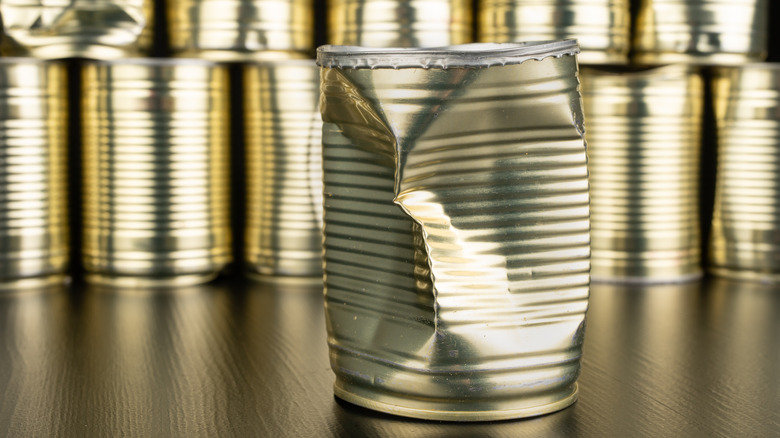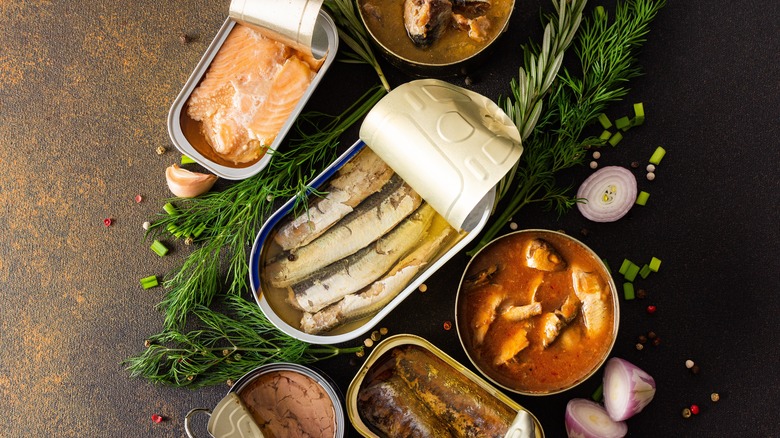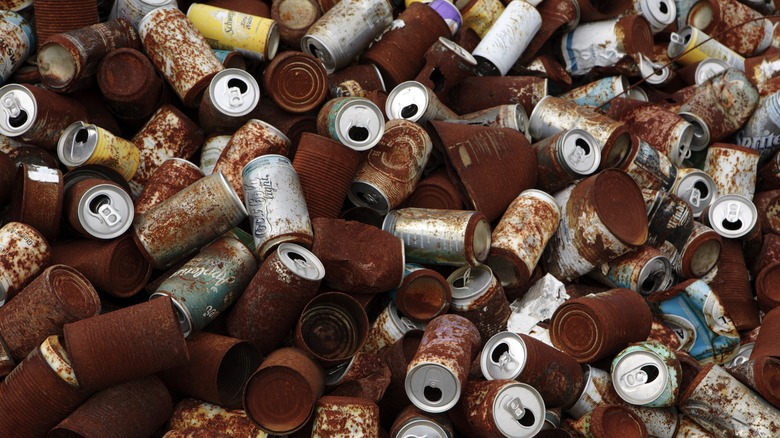Can You Eat Food From Dented Canned Goods?
It's taco night, and you're scouring through your pantry for that can of black beans that you bought just last week for the occasion. But what's that you see — a big, fat dent on the can? There go those dinner plans, you think! Except — don't throw it away just yet, for not all may not be lost.
Dented cans are generally considered a huge no-no due to the fear of contamination. After all, dents, cuts, and nicks can expose the food inside the container to dangerous bacteria and toxins, including clostridium botulinum, which causes botulism — a neurotoxin that causes paralysis and possibly death (via USDA). However, the consequences aren't always as grave. Sure, there are times when you should throw away the can, but there are also instances where you can safely eat the food inside. It all largely depends on the size of the dent and where on the can it is placed.
According to the USDA, if the dent is relatively small, and there is no other damage to the can, it's perfectly fine to eat the food inside. On the flip side, if the dent is deep enough for you to lay a finger in it, it's best to trash the can entirely. Such dents usually have sharp points that can compromise the integrity of the metal container, exposing the food inside to harmful contaminants. So observe the can closely: If the dent is small and without any pointy edges, you're likely good to use it.
The placement of the dent matters too
Its size and sharpness aside, an important factor to consider is where that dent is placed. For instance, cans have seams that are located either on the sides, at the top near the lid, or even at the very bottom end of the container. This is where the metal joins together into an airtight seal, so any nicks or craters here can compromise the can's anaerobic (oxygen-free) environment. This, in turn, can expose the food inside to harmful bacteria like Clostridium botulinum and make it unsafe for consumption. In short, don't eat food from cans with deep and sharp dents, or those that are nicked near the seams.
You could try boiling the canned food to salvage it since high temperatures can kill botulism-causing toxins. This works especially well if the food is acidic — think canned tomatoes — as these are less susceptible to being contaminated with botulism in the first place. Plus, acidity affects the shelf life of canned foods in different ways — it can keep food safer but erodes the can's lining over time.
However, when in doubt, it's always best to throw the can straight into the trash. Don't even try to open it if it looks especially damaged, as doing so can expose your entire kitchen to dangerous bacteria. Simply double-bag it and toss it — preferably into a trash can that's located outside your home. You can never be too careful!
Other signs that canned food is no longer safe to eat
Regardless of the type of dent, there are certain times when the food inside a can is definitely no longer safe to eat. Although canned goods are ribbed to make them more sturdy, they are susceptible to damage nevertheless. Any tears, punctures, cuts, holes, or leakage are major red flags as these usually indicate that the sterilized contents have been exposed to outside elements. The same goes for cans that are cracked or whose lids have loosened.
It's also best to discard containers that look swollen. This happens when the food inside has spoiled, causing bacteria to rapidly multiply in the environment. These bacteria then release gasses that pressurize the can into puffing up. Another thing to be wary of is rust. While a little bit of corrosion that you can wipe off with your hands is okay, you'll want to throw away anything that looks rusted beyond recognition.
Furthermore, your canned food may be compromised even if everything appears to be fine from the outside. For example, you should never eat canned food that was accidentally frozen. Be cautious of cans that make a powerful hissing sound, or which sputter, foam, or spray out liquid when cracked open. Mold and rot are obvious signs that the container belongs in the bin, as is any foul stench wafting from the canister. These are generally indicators that your canned food is no longer fit for consumption.



